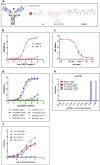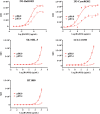Preclinical development of ozuriftamab vedotin (BA3021), a novel ROR2-specific conditionally active biologic antibody-drug conjugate
- PMID: 40202784
- PMCID: PMC11988251
- DOI: 10.1080/19420862.2025.2490078
Preclinical development of ozuriftamab vedotin (BA3021), a novel ROR2-specific conditionally active biologic antibody-drug conjugate
Abstract
Receptor tyrosine kinase-like orphan receptor (ROR2) has been identified as a highly relevant tumor-associated antigen in a variety of cancer indications of high unmet medical need, including melanoma, renal cell carcinoma, osteosarcoma, gastrointestinal stromal tumor, colorectal cancer, pancreatic ductal adenocarcinoma, and non-small cell lung cancer. Overexpression of ROR2 often correlates with advanced disease or poor prognosis, making it an attractive target for cancer therapy. We developed a novel, conditionally active biologic (CAB) antibody-drug conjugate (ADC), ozuriftamab vedotin (BA3021), which binds to ROR2 only in the acidic tumor microenvironment. In healthy tissue, binding to ROR2 is greatly reduced by a novel selection mechanism using physiological chemicals as protein-associated chemical switches (PaCS). The CAB anti-ROR2 ADC displays the anticipated binding properties and mediates potent lysis of ROR2-positive cancer cell lines. In vivo, BA3021 has potent and durable antitumor activity in human cancer xenograft mouse models, including patient-derived xenograft models. In non-human primates, BA3021 was well tolerated at doses of up to 10 mg/kg and showed excellent stability in vivo. These preclinical results indicate that CAB anti-ROR2 ADC is efficacious and well tolerated and may be a promising treatment for cancer patients with ROR2-expressing tumors.
Keywords: ADC; ROR2; conditionally active; tumor targeting.
Conflict of interest statement
All authors are shareholders of BioAtla, Inc., which owns intellectual property rights to CABs- and PaCS-related technology. HWC, GF, and JMS are inventors of relevant patents. JMS serves as a Director of BioAtla.
Figures






References
-
- Henry C, Quadir A, Hawkins NJ, Jary E, Llamosas E, Kumar D, Daniels, B., Ward, R.L., Ford, C.E. Expression of the novel wnt receptor ROR2 is increased in breast cancer and may regulate both beta-catenin dependent and independent wnt signalling. J Cancer Res Clin Oncol. 2015;141(2):243–254. doi: 10.1007/s00432-014-1824-y. - DOI - PMC - PubMed
MeSH terms
Substances
LinkOut - more resources
Full Text Sources
Medical
Miscellaneous
